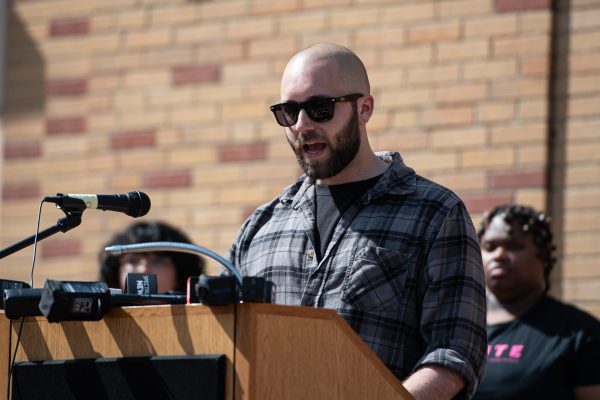LETTERS TO THE EDITOR
February 7, 2005
Using abs may help prevent balding
Dear Editor:
So, this is how you lose it. Most people don’t use their abs, a typical symptom of widespread abuse of the body.
Simply, we’re lost in our minds to the point of complete ignorance regarding our bodies — sometimes to the point of growing old and crooked, and we think calcium supplements are going to cure us. Our bodies are the most significant and majestic machines known to man, yet most of us degrade it every chance we get.
It all begins and usually ends with a fundamental disrespect to the mechanics of the body. In a society so focused on increased productivity achieved through reaching peak efficiency, our bodies, our temples of health have been sacrificed.
Mainly, my attention has been focused on the abs. It is here where a solution occurs. From my perspective, when we don’t use our abs, a lot of pressure and weight is shifted to our backs, beginning with our lower backs, which aren’t prepared for such a complete burden; hence lower back pain and strain. But it goes further.
I’m referring to effects up through the spine and body as a result of this imbalance in the base foundation of our body, the machine. A strain is created on the two muscles that run on either side of the spine and the constant strain on these muscles sends a current from the base of the spine up, wrapping around the top of the head ending in tension right around the area where men’s hairlines recede. It appears to me that a portion of men with receding hairlines have such not from heredity, but from lifestyle habits that they don’t realize.
I don’t quite know the exact adage, but it goes something to the effect of not “holding your nose up in the air.”
It’s so vague to me that I don’t exactly remember. But by not using our abs in everyday life, that happens to us.
When you do use your abdominal muscles and specifically your lower abs, it immediately pulls you forward, makes you stand up straight. It noticeably removes tension from your skull and neck, you can feel the blood flow open up and become the necessary nutritional support needed to fuel hair follicles.
The body is incredibly regenerative. And I do think that we are only exposed to a small portion of that in our lives, the automatic immune responses. We have been bred to accept the doctor as our god of health, and we bow oh so graciously to our medical Buddha. But you can control, if you choose to, the thoughts and energies that tear us down and build us up.
Branden Schilling
Graduate student in liberal studies
Cleveland Indians should change mascot
Dear Editor:
Concerning the Point/Counterpoint of Feb. 2:
What is so offensive about the notion of politeness and decency in cultural discourse? Why are those who call for it branded as “leftist ideologues” of the “radical left” by people like Mr. Tony Cox?
Chief Wahoo is a racist image. Its belittling depiction of stereotypical physical features of Native Americans is offensive. I am a white, European American, so please do not take my word for it. Dozens of cultural organizations such as the American Indian Movement and the Ohio Center for Native American Affairs have insisted upon the permanent retirement of Wahoo and similar mascots. Unlike those of Irish and Italian descent in Mr. Cox’s column, these groups have spoken.
As much as I would like to see the Cleveland mascot changed, I would settle for open acknowledgment by the team and the fans that the image is offensive. We know this because Native Americans have said as much. But I know this is too much to ask.
I love baseball, and I love Cleveland. I root for the Indians, but I will never wear the Wahoo logo. It is not about the restriction of free speech but rather the deliberate, conscious effort to treat everyone equally. Politeness and decency should not be this difficult. Ms. Erin Roof is correct in stating that “Every one of us should be appalled.” But because this logo, this relic of the pre-civil rights era, has survived into the 21st century, I am afraid I must disagree with Mr. Cox in his assertion that most “people today know the evils of racism.” If most know of such evils, why do so few act accordingly?
Robert L. DelBane
Graduate student in English literature























